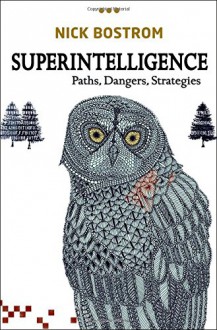Superälyyn: Polkuja, vaarat, strategioistaan Nick rumpaliksi
Superälyyn Nick rumpaliksi väittää, että meidän täytyy antaa robotit inhimillisten arvojen
1950-luvulta lähtien tekoäly kannattajat ovat väittäneet, että koneiden ajattelu ihmiset ovat vain pari vuosikymmentä myöhemmin. Superälyyn-humoristinen Katso ja menneisyyden, nykyisyyden ja ennen kaikkea tulevaisuuden AI-Nick Boström, perustajajäsen johtaja Oxfordin yliopiston tulevaisuuden ja ihmiskunnan Institute, alkaa pilkkaamalla futuristit.
"Kaksi vuosikymmentä on sweet spot prognosticators murrosaikaa: lähellä tarpeeksi huomiota herättäviä ja tarvittaessa vielä tarpeeksi pitkälle tehdä mahdollista, että merkkijono läpimurtoja, tällä hetkellä vain epämääräisesti kuviteltavissa, ehkä silloin on tapahtunut," hän kirjoittaa. Hän toteaa myös, että 20 vuotta voi olla lähellä tyypillinen jäljellä oleva kesto ennustajan ura, rajoittaa "rohkean päätöksen maineeseen liittyvät riskit".
Vielä hänen kirja perustuu oletukseen, että AI tutkimus ennemmin tai myöhemmin tuottaa tietokoneen yleistä tietoa (eikä erityistä kykyä kuten shakista), joka vastaa ihmisen aivot. Kun yritysten vanhan kaartin kuten IBM on pitkään ollut kiinnostunut alalla, uuden sukupolven Yhdysvaltojen länsirannikolla tekee hyvää vauhtia. Johtajia Google tarjoaa PR johti välähdyksiä sen työelämään Kuljettajattomat autot ja Neuroverkkojen, että oppia tunnistaa kasvoja, kun he etsivät kuvia miljoonia verkkosivuja.
Lähestymistapoja AI kuuluvan kahteen päällekkäisiä luokkaan. Joka perustui neurobiologian, tavoitteena on ymmärtää ja jäljitellä ihmisaivojen toimintaa. Toisaalta perustuu tietotekniikan, käyttää epäorgaaniset arkkitehtuuri elektroniikan ja ohjelmistojen tuottaa älykkyyttä, ilman huolta liikaa, miten ihmiset ajattelevat. Rumpaliksi tekee tuomitsematta joka todennäköisesti onnistuisi.
Olemme vielä kaukana todellinen AI huolimatta viime kuussa yleisesti tunnettu "Enigma" temppu, jossa tietokone mimicked 13-vuotias poika jonkin verran menestystä lyhyt teksti keskustelun. Noin puolet maailman AI asiantuntijat odottavat ihmisen tason koneen älykkyyttä saavuttamiseksi vuoteen 2040 viimeaikaisten tutkimusten mukaan, ja 90 prosenttia sanoa se on perillä viimeistään 2075. Rumpaliksi suhtautuu varovaisen ajoitus, mutta katsoo, että teon ihmisen tason AI todennäköisesti johtaa paljon suuremmassa mittakaavassa "superälyyn" nopeammin kuin paras asiantuntijas – ja että sen vaikutus on todennäköisesti joko hyvä tai erittäin huono ihmiskunnalle.
Kirja tulee omaperäisempi alueelle puhuttaessa superälyyn syntymistä. Älykkäät koneet ottaen maailmassa sci-fi skenaario voisi tulla todellisuutta hyvin pian kun toimivalta ylittää ihmisen aivot, rumpaliksi väittää. Koneita voisi parantaa kykyihinsä paljon nopeammin kuin ihmisten tietotekniikan tutkijoita.
"Koneita on useita keskeisiä etuja, jotka antavat heille ylivoimainen paremmuus," hän kirjoittaa. "Biologiset ihmisillä, vaikka entistä olla outclassed." Hän esittelee eri tavoin Ai paeta fyysinen joukkovelkakirjojen laitteiston, jolla se kehittynyt. Esimerkiksi se voisi käyttää hakkerointi suurvalta hallita robotti käsittelylaitteet ja automaattisten labs; tai käyttää toimivaltaansa sosiaalisen manipuloinnin suostutella ihmisen yhteistyökumppaneita työtä. On peitelty valmisteluvaiheessa, jossa mikroskooppisen yhteisöt pystyvät jäljittelemään nanoteknologia tai biotekniikan sijoitettu maailmanlaajuisesti erittäin alhainen pitoisuus. Sitten on esiasennettu nanofactories tuottaa hermokaasu tai kohde tavoitteleva mosquito, kuten robotteja voi keväällä esiin (vaikka rumpaliksi toteaa, superälyyn voisi todennäköisesti kehittää tehokkaampia julkisia ostotarjouksia koskevan suunnitelman kuin hän).
Mitä maailma olisi kun ottivat? Se sisältää paljon monimutkaisia ja älykkäitä rakenteita kuin mitä kuvitella tänään- mutta puuttuu tahansa että se on tietoinen tai joiden hyvinvointia on moraalinen merkitys. "Yhteiskunnan talouden ihmeitä ja teknologian ihanuutta, kukaan saada," kuten rumpaliksi. "Disneyland lapseton."
Rumpaliksi kirjallisesti, usein selkeät ja kirkkaat, joskus veers läpinäkymätön kielelle, joka paljastaa hänen tausta filosofian professori. Mutta ei ole epäilystäkään voimassa hänen väitteitä. Vaikka hän ei väitä, että eksistentiaalinen katastrofi on väistämätön pitkän aikavälin seuraus AI tutkimus, hän osoittaa, on riittävän suuri yhteiskunta nyt miettiä keinoja estää se kartuttaa tulevia AI positiivisia inhimillisiä arvoja.
Miten niin ei ole selkeätä; yksinkertaisesti siirtää inhimillisiä arvoja ohjelmakoodia ei todennäköisesti toimi. Ongelma on tutkimuksen haaste arvoinen seuraavan sukupolven


 Log in with Facebook
Log in with Facebook 





